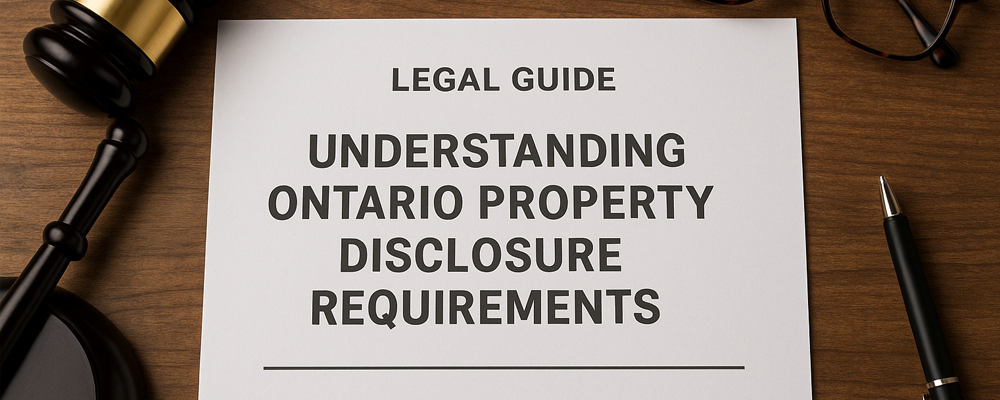Selling a home in Ontario is more than just finding a buyer. Sellers must follow strict legal rules about what they reveal to buyers. This guide explains the Ontario property disclosure requirements, what sellers must disclose, and how to protect yourself during the process.
What Is Ontario Property Disclosure?
Ontario property disclosure refers to the legal obligation for sellers to inform buyers about certain defects or issues with the property. The goal is to ensure buyers make informed decisions and to prevent disputes after the sale.
Legal Framework for Disclosure
The main law governing property disclosure in Ontario is the Real Estate and Business Brokers Act, 2002 (REBBA). Sellers must disclose any known material latent defects. These are problems that are hidden and not visible during a regular inspection but could affect the property’s value, safety, or use .
What Are Material Latent Defects?
Material latent defects are hidden issues that:
Are not visible during a standard inspection
Could make the home unsafe or unfit to live in
Would impact the buyer’s decision to purchase
Examples include:
Mold or pest infestations
Structural issues like foundation cracks
Water leaks or flooding problems
Electrical or plumbing deficiencies
Environmental hazards such as asbestos or lead paint
Patent defects, or problems that are obvious and visible, do not need to be disclosed by law in Ontario.
What Must Sellers Disclose?
Sellers in Ontario must disclose:
Any known material latent defects
Environmental hazards (e.g., asbestos, radon, lead paint)
Structural or mechanical problems (e.g., leaky roof, faulty wiring)
Legal issues affecting the property (e.g., boundary disputes, liens)
Renovations or repairs done without permits
Insurance claims related to the property
If the property is in a flood zone or near a noisy highway, these should also be disclosed.
The Seller Property Information Statement (SPIS)
In Ontario, sellers often use the Seller Property Information Statement (SPIS) to document disclosures. The SPIS is a detailed form covering:
Previous damage or repairs
Insurance claims
Renovations and permits
Issues with systems (plumbing, electrical, HVAC)
Environmental and neighborhood concerns
Note: Completing the SPIS is voluntary in most of Ontario, but some local real estate boards may require it. Even when not required, it is strongly recommended because it helps prevent disputes and builds trust with buyers.
When and How to Disclose
Disclosures must be made in writing and given to the buyer before an offer is accepted, or as soon as the seller becomes aware of new information. This ensures transparency and protects both parties from future legal issues.
The Role of Real Estate Agents
Real estate agents in Ontario have their own ethical obligations. They must:
Advise sellers about disclosure requirements
Ensure all known material facts are shared
Refuse to list a property if the seller will not disclose a known defect
Agents often recommend using the SPIS to document all disclosures.
Risks of Failing to Disclose
Failing to meet Ontario property disclosure requirements can lead to:
Legal action from the buyer
Financial penalties or having to pay for repairs
The sale being canceled
If a buyer discovers a hidden defect after the sale, they may sue the seller for damages. However, the buyer must prove the seller knew about the defect and deliberately concealed it.
Best Practices for Sellers
To ensure a smooth transaction:
Disclose all known material latent defects honestly
Keep records of repairs, inspections, and permits
Consult a real estate lawyer or professional for guidance
Use the SPIS even if not required
Transparency builds trust and protects you from future disputes.
Frequently Asked Questions
Is the SPIS mandatory in Ontario?
What if I discover a defect after accepting an offer?
Should I consult a lawyer?
Conclusion
Understanding Ontario property disclosure rules is essential for every seller. By being honest and thorough, you protect yourself and help buyers make confident decisions. If you have questions or need help, contact a real estate professional or lawyer.
Ready to sell your property with confidence? Contact Bridge today for expert guidance on Ontario property disclosure and a smooth selling experience.




